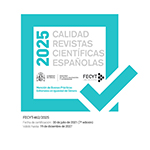Diversidad léxica en el uso de cuantificadores en el registro coloquial en Bogotá y Cali, Colombia
Resumen
El presente estudio analiza el uso de cuantificadores no tradicionales, por ejemplo, un pocotón, un tris, pertenecientes al registro coloquial observado en las ciudades de Bogotá y Cali, Colombia. 122 estudiantes universitarios de Bogotá y 153 de Cali respondieron encuestas en las que se solicitaba incluir todas las expresiones para cantidades altas y bajas utilizadas en cualquier situación cotidiana. Las entradas léxicas obtenidas se sistematizaron con la información acerca del carácter del cuantificador (cantidad baja o alta), se calculó la cantidad de repeticiones de cada entrada en la población y se realizaron análisis estadísticos ANOVA. En resumen, se observaron diferencias entre las entradas utilizadas en las dos ciudades, se detectó una tendencia marcada a utilizar frases nominales para cuantificar y se concluyó que el uso de expresiones cuantificadoras complejas obedece a la necesidad de comunicar connotaciones positivas o negativas sutiles que los hablantes desean expresar a través de la cuantificación.
Descargas
Descarga artículo
Licencia
La revista Dicenda. Estudios de lengua y literatura españolas, para fomentar el intercambio global del conocimiento, facilita el acceso sin restricciones a sus contenidos desde el momento de su publicación en la presente edición electrónica, y por eso es una revista de acceso abierto. Los originales publicados en esta revista son propiedad de la Universidad Complutense de Madrid y es obligatorio citar su procedencia en cualquier reproducción total o parcial. Todos los contenidos se distribuyen bajo una licencia de uso y distribución Creative Commons Reconocimiento 4.0 (CC BY 4.0). Esta circunstancia ha de hacerse constar expresamente de esta forma cuando sea necesario. Puede consultar la versión informativa y el texto legal de la licencia.









